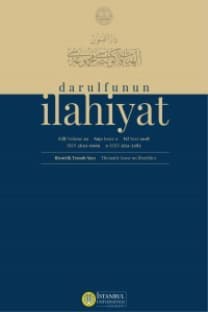NUSAYRIYAH: AN ESOTERI C LIVIN G RELIGIOU S SEC T IN TH E SECULA R MILIEUO F TURKIS H REPUBLIC *
xx
NUSAYRIYAH: AN ESOTERI C LIVIN G RELIGIOU S SEC T IN TH E SECULA R MILIEUO F TURKIS H REPUBLIC *
Nusayriyah, Nusayri, Alawis Muhammad Ibn Nusayr,
___
- -
- Yayın Aralığı: Yılda 2 Sayı
- Başlangıç: 1925
- Yayıncı: İstanbul Üniversitesi İlahiyat Fakültesi
HALİL CİBRAN'A GÖRE RUHSALLIK VE AKIL ARASINDAKİ DENGE
'ÖTEKİ'Yİ ANLAMAK: TÜRKİYE'DE DİNLER ARASI DİYALOGA DAİR TUTUMLAR
BUDİZMLE MUKAYESELİ OLARAK İSLAM VE İSLAM MİSTİSİZMİ: MÜSLÜMAN-BUDİST DİYALOĞUNA BİR KATKI
Yazan: YARAN, Cafer Sadık YARAN, Çeviren: ATALAY
SAVAŞIN DOĞALLIĞINDAN BARIŞIN İMKÂNINA: İBN HALDÛN'DA SAVAŞ VE BARIŞ KURAMI
THE IDEA OF 'MULTIPLE MEANINGS' IN AL-JURJANI' S THEORY O F COMPOSITION *
NORMATİF GELENEĞE KARŞI SEMBOLİK ANLATIM: İBNÜ'L-ARABÎ'DE HARF SEMBOLİZMİ
C-5 MİSYONERLİĞİNİN GÜÇLÜKLERİ: CHRISLAM?
"OKUL ÇAĞI" ÇOCUKLARININ AİLEDE DİN EĞİTİMİ
The 114 European Workshop: Religious Diversity and Intercultural Education*
NUSAYRIYAH: AN ESOTERI C LIVIN G RELIGIOU S SEC T IN TH E SECULA R MILIEUO F TURKIS H REPUBLIC *
